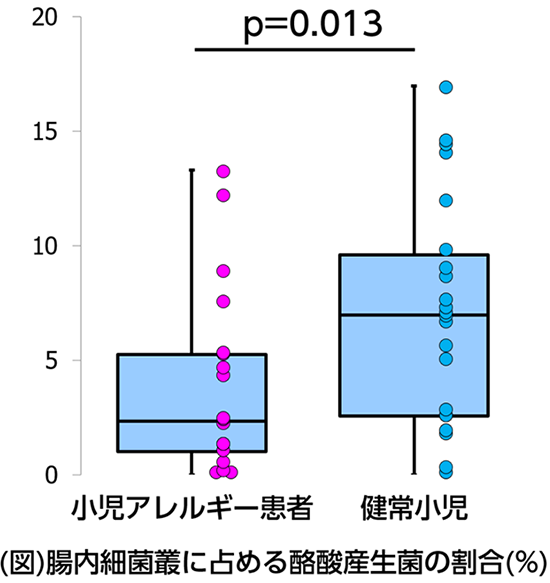The research group at Kansai Medical University Department of Pediatrics, consisting of Department Chair Kazunari Kaneko, Dr. Mitsuru Yamagishi, and lecturer Shohei Akagawa, compared the gut microbiota of children with chicken egg allergies to those of healthy children, and discovered that the children with chicken egg allergies have reduced gut microbiota diversity and that they have a lower proportion of butyric acid-producing bacteria in their gut microbiota.
It has become clear that disturbances in gut microbiota are involved in the development of a variety of diseases. According to Dr. Akagawa, "The butyric acid produced by butyric acid-producing bacteria is known to increase the regulatory T cells that suppress excessive immune response in the intestine, and we suspected that children with food allergies had a reduction in butyric acid-producing bacteria."
In order to accurately diagnose chicken egg allergies, a high-risk "oral food challenge test," in which the child is fed chicken eggs to confirm if allergic symptoms appear, must sometimes be performed. In consideration of this point, the research group performed a genetic analysis using stool samples from 18 children with chicken egg allergies and 22 healthy children to verify their intestinal flora diversity, constituent flora, and the proportion of butyric acid-producing bacteria.
In the results, they confirmed that the children with chicken egg allergies had significantly lower diversity in their gut microbiota and, additionally, they also found that the children with chicken egg allergies had a significantly lower proportion of butyric acid-producing bacteria. This suggests that the decrease in butyric-acid producing bacteria leads to a decrease in regulatory T cells, thus causing allergic symptoms because the excessive immune response cannot be prevented.

Credit: Kansai Medical University
Dr. Akagawa said, "We believe that improving these disturbances, which are characterized by a decrease in butyric acid-producing bacteria, will lead to the prevention and treatment of a variety of allergic diseases. Specifically, this can be doing things such as administering butyric acid-producing bacteria as a probiotic, as a prebiotic, and routinely consuming foods that are high in the indigestible dairy fiber that is easily metabolized by butyric acid-producing bacteria. We plan to conduct intervention trials in the future."
■Butyric acid-producing bacteria: A general term for bacteria in the human intestine that can produce butyric acid by fermenting and breaking down dietary fiber. Butyric acid promotes the differentiation of regulatory T cells in the intestinal tract, and it is known to have the function of suppressing excessive immune responses.
■Prebiotics and probiotics: Prebiotics are indigestible food components that have a beneficial effect on people and improve health by selectively altering the growth and activity of specific bacteria in the large intestine. Examples include oligosaccharides and dietary fiber. Probiotics, on the other hand, refer to foods containing microorganisms and to living microorganisms that have a positive effect on the health of the host by improving the balance of gut microbiota. Examples include Bifidobacterium, lactic acid bacteria formulations, yogurt, and lactic acid bacteria beverages.
This article has been translated by JST with permission from The Science News Ltd.(https://sci-news.co.jp/). Unauthorized reproduction of the article and photographs is prohibited.




